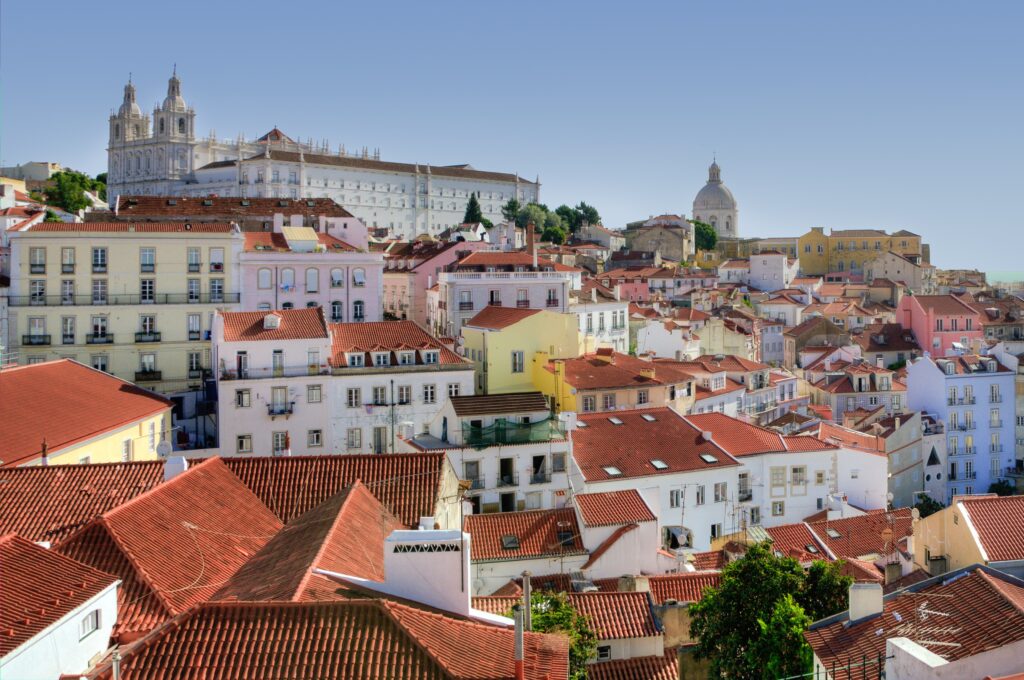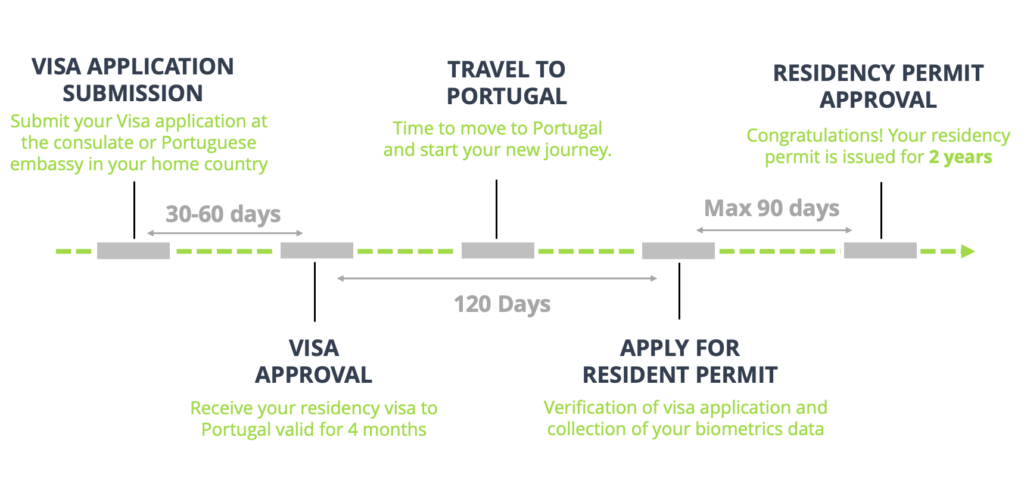What is the Portugal D3 Visa?
D3 High-Qualified Worker visa in Portugal, which is also known as the “Highly Qualified Professional” visa. This visa is designed for non-European Union citizens who have high qualifications and extensive experience in a particular field.
With this visa, the visa holder and their family can enter Portugal for work purposes and establish residence.
Once the visa has expired, the visa holder can apply for a Portuguese Residence Permit and the European Union Blue Card, which is a Residence Permit for highly qualified professionals with a scope throughout the European Union.

What is a highly qualified activity?
According to Portuguese Law on Foreigners, highly qualified work implies “the exercise of an activity that requires specialized technical skills of an exceptional nature or an adequate qualification for the respective exercise of the function”.
The European Commission considers that the highly qualified activity is that exercised by professionals falling into either of two groups:
- Management positions: as executives, officers and legislators; senior public administration officers, company directors; administrative and commercial managers; service and similar managers;
- Experts in intellectual and scientific activities: such as engineers and scientists, teachers, health professionals, business professionals, information and communication technology specialists, cultural professionals and legal experts.
Minimum qualifications for the Portugal D3 Visa
To be eligible for the High Qualified Professional Visa at the Portuguese Embassy or Consulate, the applicant must have either an employment contract or a promise of employment contract, and meet the following specific requirements:
Experience
The applicant must demonstrate that their intended activity falls under the category of highly qualified work and provide evidence of appropriate qualifications or experience to carry out the work.
Employment Contract
A valid employment contract or the promise of an employment contract, which must be valid for a minimum period of six months and state the position and the qualified specialty.
Annual Salary
The applicant must ensure that their expected salary is equal to or greater than an annual salary of 1.5 times the national average gross annual salary or three times the social support index (IAS)*.
It means you should have annual salary around €20,000.
*The IAS is the reference value for calculating Social Security in Portugal and its value since 1st January, 2025 is €522,50.
Additionally, if the applicant fulfills all the legal requirements and can provide evidence of their legal entry and stay in Portugal, they have the option to apply for a Direct Residence Permit for highly qualified individuals.
This permit allows them to obtain Portuguese residency without the need for a visa.

Who is eligible for the D3 Visa Portugal?
To be eligible, you need to meet the following Portugal D3 Visa requirements:
- Be a non-EU citizen.
- Have sufficient funds to support yourself.
- Meet the passive income requirements.
- Have travel insurance.
- Have a clean criminal record.
- Deliver proof of accommodation in Portugal.
Personal Financial means for Portugal D3 Visa
Authorities ensure you have enough means to reside in Portugal for at least one year during the verification process. You must deposit in a Portuguese bank account and prior to the application a minimum of €10,440.
Adding family members to the application requires additional amounts: €5,220 for your partner and €3,132 for each child.
A family of four, including parents and two minors, must deposit €21,924 into a Portuguese bank account.
Which are the Benefits of the D3 Visa Portugal?
Mobility
The D3 High Qualified Professional Visa Portugal allows you visa-free entry and circulation through the Schengen Area.
EU Blue Card eligibility
If you meet the requirements — such as holding a highly skilled employment contract and earning the required minimum salary — you can apply for the EU Blue Card directly upon entering Portugal with a D3 Visa.
Once you have legally resided in Portugal for 18 months with a valid EU Blue Card, you may relocate to another EU Member State to continue working in a highly qualified profession, together with your family.
Live, Work, Study
Once you become a resident in Portugal you are entitled to conduct any professional activity as an independent professional and you gain access to the National Education Service, schools, and vocational training.
Healthcare
Being a resident in Portugal you gain access to National Healthcare, also called SNS (Serviço Nacional de Saúde) and covers primary and secondary healthcare needs.
Citizenship
After five years of legal residency, you may apply for permanent residency or to citizenship. However, in this case you’ll have to pass a Portuguese language test.
Family Reunion
You are entitled to bring your family members who are already in Portugal or who will be joining you in Portugal. You may request family reunification in AIMA (former SEF) after you receive your residence card or apply at the same time as your visa application.
The following is the list of family members that may qualify for family reunification under the D3 Portugal Visa:
- Your spouse or partner.
- Your children under 18 years of age or incapacitated children dependent of the couple or of one of their spouses/partners.
- Children under 18 years old who were adopted by the applicant or the spouse.
- Children over 18 years old who are dependent on you or on your spouse, and who are single and studying.
- Your parents or your spouse/partner’s parents if they are dependent on you.
- Your minor siblings.
Tax Benefits
One of the D3 Visa benefits is the access to a special tax regime known as NHR (Non-Habitual Resident). Under this program, you are exempt from or pay very little taxes on any foreign-sources income.

Which is better, Portugal D3 Visa or D1 Visa?
When deciding between a D3 Visa and a D1 Visa in Portugal, it’s essential to consider your specific circumstances and objectives. Several factors come into play:
Firstly, in terms of priority and ease of application, the D3 Visa generally offers a smoother and faster process compared to other visa types. It receives higher priority by the Portuguese government, resulting in quicker approval times.
Regarding work opportunities, the D3 Visa stands out as it opens the possibility of obtaining an EU Blue Card in Portugal. With an EU Blue Card, you gain the ability to work and live in any EU Member State, offering enhanced career prospects and increased mobility within the European Union.
While the D1 Visa does not automatically lead to an EU Blue Card, it still provides various work opportunities and the option to obtain a work permit in Portugal.
When it comes to tax treatment and residency benefits, having a D3 Visa can potentially facilitate the transition to preferential tax treatment under Portugal’s Non-Habitual Resident (NHR) regime.
How to renew the Portugal D3 Visa?
The residence permit will be valid for 2 years and renewable for another 3 years. As per law the family members can join the applicant in Portugal through the Family Reunification process.
After legally residing in the country for 5 years, the applicant may apply for both Portuguese citizenship and Portuguese passport.
Applying for the Portugal D3 Visa
Step 1 – NIF and Bank Account
To apply for the Portugal D3 Visa, you need to obtain a Portuguese Tax Number (NIF) and open a bank account in Portugal. To obtain a NIF, you can apply online or in person at a tax office in Portugal. Opening a bank account can be done remotely. You also need to appoint a tax representative in Portugal.
Step 2 – Secure your Accommodation
To be eligible for the D3 High-Qualified Professional Visa, you need to demonstrate that you have secured accommodation in Portugal.
This can be in the form of a rental agreement signed at least for one year or proof of property ownership.
Step 3 – Submit your Visa Application
To apply for the D3 Residency Visa, you need to submit your application at the Portuguese Consulate or Embassy, VFS Global or similar in your home country but never in Portugal.
You will need to provide several documents, including your passport, proof of income, travel insurance, and proof of accommodation.
Step 4 – Apply for a resident permit in Portugal
Once you arrive in Portugal, you will need to apply for a resident permit at the Agency for Integration, Migration and Asylum (AIMA). This will allow you to stay in Portugal for the duration of your visa.
Application timeline of D3 Visa Portugal

Documents required for the Portugal D3 Visa
The Portugal D3 residence visa requires the following documents:
- D3 Visa Application Form
- Your Valid Passport
- Two recent passport-size photos
- Criminal Record certificate
- Valid travel insurance, including medical coverage
- Proof of reasonable regular income
- Documentary evidence of having accommodation in Portugal
- Employment or services contract
- Proof of sufficient means in Portugal (latest 3 months bank statements)
- Declaration with the reasons for requesting Portuguese Residency
Cost of the D3 Visa Portugal
The cost of the D3 visa is relatively low and varies depending on the consulate where you apply, but for a single applicant you may expect to pay:
- €90-€100 for your entry visa application at the Consulate in your home country
- €181 to submit and receive your resident permit from the AIMA in Portugal
You should have to consider some additional costs regarding flight tickets, travel insurance, relocation services, accommodation, paperwork including translations or documents apostille.
Alternative Work visas
Portugal offers several alternative types of working visas for individuals who do not meet the requirements for the Highly Qualified Professional (HQP) visa.
These visas cater to various professions and lifestyles, making it easier for individuals to live and work in Portugal.
- Digital Nomad visa for remote workers and freelancers allow them to live and work in the country for up to a year, enjoying all the benefits of the Portuguese lifestyle while earning an income from their remote job or business.
- D2 Entrepreneur Visa in case you are an entrepreneur looking to start or develop a business in Portugal, which allows you to obtain a residence permit for up to two years.
- Work visa for those with a job offer in Portugal is the way to go. The employer must sponsor the visa and prove that the position could not be filled by a Portuguese citizen or EU national. Once approved, the visa is valid for up to one year and can be renewed.

Why choose us for your D3 Visa application?
Local Expertise
We know Portugal. Due to our extensive local knowledge, we believe that concentrating our services in a single country destination is the best way to give you the most thorough and useful information.
Holistic Approach
One single channel of communication for the entire process. We provide you with a comprehensive service that covers all aspects of your move, from identifying the ideal residency visa to finding your new home or helping you to settle.
Transparent Service
We recommend what’s best for you based on an extensive process experience that saves time and money to clients. Our pricing is clear and competitive, and we don’t sell services that make us more money.
Simple Process
Technology plays a very important role in our company. We minimize our clients’ involvement in paperwork. We are customers ourselves and we know how to serve you.
Frequently Asked Questions About D3 Highly Qualified Work Visa
What is the D3 High-Qualified Worker Visa in Portugal?
The D3 High-Qualified Worker Visa is a residence permit in Portugal designed for highly skilled professionals who have a job offer or employment contract in a specialized field.
What are the main differences between D3 visa Portugal and D1 Work visa?
The D3 visa in Portugal offers priority processing, fewer document requirements, and the potential to obtain an EU Blue Card. On the other hand, the D1 Work visa has a significant disadvantage of requiring the company to advertise the vacancy, prioritizing EU citizens for employment. This adds a complex bureaucratic procedure that can be avoided with the D3 visa.
Can I apply for the Portugal D3 Visa if I don't have a job offer yet?
Generally, the D3 High-Qualified Worker Visa requires a valid job offer or employment contract from a Portuguese employer.
However, there may be certain exceptions or alternative pathways for highly skilled professionals, such as self-employment or entrepreneurship.
Can I apply for permanent residency or citizenship through the Portugal D3 Visa?
Yes, it is possible to apply for permanent residency or citizenship in Portugal after holding the D3 High-Qualified Worker Visa after five years of legal residence.
Are there any financial requirements for the D3 Visa Portugal?Pergunta 5
While the D3 High-Qualified Worker Visa does not have specific financial requirements, it is generally expected that applicants have sufficient funds to support themselves during their stay in Portugal.
Can I bring my non-dependent family members, such as parents or siblings, on the Portugal D3 Visa?
The D3 High-Qualified Worker Visa is primarily designed for immediate family members, including spouses and dependent children. Bringing non-dependent family members such as parents or siblings may require a different type of visa or residence permit.
Can I apply for the Portugal D3 Visa while in Portugal on a different type of visa?
It is generally recommended to apply for the D3 High-Qualified Worker Visa from your home country or country of legal residence
Which occupations qualify for the D3 High-Qualified Worker Visa?
The D3 High-Qualified Worker Visa is typically granted for jobs in high-demand sectors such as technology, engineering, healthcare, research, and other specialized fields.




